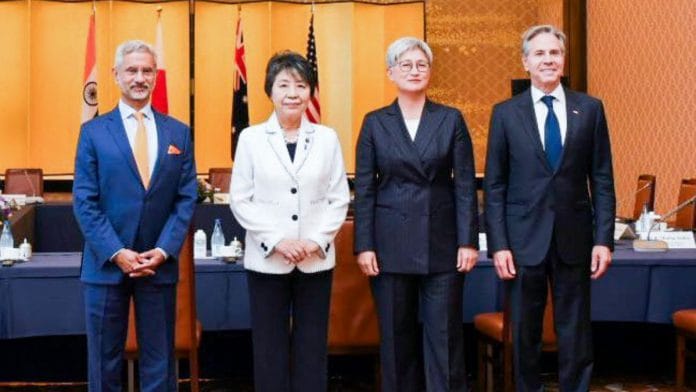The Quad Foreign Ministers’ meeting held on 29 July in Tokyo highlighted the grouping’s focus on regional security and stability. Comprising Australia, India, Japan, and the United States, the Quad emphasises that their cooperation is not aimed at any specific country. Nonetheless, China remains a central concern.
While official statements have avoided direct mention of China, the revival and scope of the Quad clearly respond to China’s assertive behaviour and the growing tensions between it and the member countries. The joint statement subtly alluded to China by highlighting the need for all countries to contribute to regional peace and stability, avoid dominance or coercion, and manage competition responsibly. It also expressed concerns about the East and South China Seas, condemning unilateral (read China’s) actions that alter the status quo through force or intimidation, and criticising the militarisation of the South China Sea.
In response to a media query about the Quad statement on the East and South China Seas, Lin Jian, a spokesperson for the Chinese Ministry of Foreign Affairs, denounced the Quad as an exclusive group that engages in scaremongering, incites antagonism and confrontation, and hinders the development of other countries.
Also read: US election is trending in Chinese media. Trump is a favourite
Chinese views of the Quad
In 2018, Foreign Minister Wang Yi dismissed the Quad as a mere “headline-grabbing idea” and “sea foam” in the Pacific and Indian Oceans, suggesting it would soon dissipate. By 2020, however, his stance had shifted markedly. He criticised the Quad as a tool of US hegemony, accusing it of reviving a “Cold War mentality” and exacerbating bloc confrontation.
There is growing anxiety among Chinese officials, the strategic community and the media about the Quad, with many failing to recognise the deep-seated resentment the Quad countries hold toward China. This oversight often amplifies a victim mentality rather than addressing underlying issues.
Zhou Shixin, a research fellow at the Shanghai Institutes for International Studies, argues that the Quad’s emphasis on ASEAN centrality is fundamentally at odds with the Quad partners’ proclaimed support for ASEAN’s role in regional multilateral cooperation. He suggests that the Quad foreign ministers’ meeting, which largely excluded ASEAN member countries and took place immediately after the ASEAN foreign ministers’ meeting in Laos, represents an affront to the ASEAN countries and could be perceived as a subtle threat. This exclusion, Zhou posits, undermines ASEAN’s centrality and risks exacerbating regional tensions.
Chinese discourse often squarely blames the US for the Quad’s revival. Many Chinese analysts and media view it as a direct result of US bloc-oriented policies. Li Haidong, a professor at the China Foreign Affairs University, remarked, “Quad is a US-led mechanism, and its joint statement shows that the US is attempting to bolster the bloc’s build-up by hyping “China threat” rhetoric and inciting security anxiety in the region, so as to make some regional countries rely more on the US-led bloc in terms of security.”
One commentary emphasises that the US regards China as its “most serious competitor” and a “systemic challenge”, framing the competition as both strategic and ideological. According to this perspective, the US has leveraged its Indo-Pacific Strategy to build a network of alliances and partnerships—including the Indo-Pacific Economic Framework, the Five Eyes Alliance, and the Quad—aimed at containing China.
Another commentary notes that the focus on the South China Sea in Quad statements is not surprising, given the long-standing efforts by the US and its allies to accuse China of militarisation in the region. This rhetoric, Chinese critics argue, is designed to mislead public opinion, foster a ‘China South China Sea threat theory’, undermine China’s sovereignty, and limit its territorial claims.
A minor section on Weibo explored India’s active role in the Quad. A post suggested that Indian External Affairs Minister S Jaishankar’s efforts are largely aimed at addressing concerns from other Quad members related to Indian Prime Minister Narendra Modi’s recent visit to Russia. On Weibo, there is more emphasis on Jaishankar’s meeting with Wang Yi in Vientiane and his comments on India-China differences following the Quad foreign ministers’ meeting, rather than on the Quad itself. This lack of focus might be due to two reasons. First, the revival of the Quad is often attributed to the US and Japan, with the recent US-Japan 2+2 meeting seen as an effort by both countries to amplify the China threat narrative, to portray China as the region’s biggest strategic challenge. Second, by downplaying India and Australia’s contributions to the Quad, the narrative suggests that these countries are more concerned with resolving their bilateral issues and less committed to the Quad than commonly perceived. This implies that, from China’s perspective, Australia and India are still seen as more amenable compared to the US and Japan.
Also read: Chinese are angry that West isn’t outraged enough by Modi meeting Putin
China underestimates Australia, India
China often underestimates the roles of individual countries within the Quad, focusing primarily on the US and viewing regional members as mere instruments in its broader Indo-Pacific strategy against China. This perspective overlooks the crucial contributions of Australia and, more importantly, India, in revitalising and sustaining the Quad. China’s disregard for their roles reflects a distorted understanding of the Quad’s dynamics.
China needs to recognise that the Quad’s success is not solely driven by the US interests but depends on the active participation and essential roles of all four member countries, particularly Australia and India. This miscalculation is evident in Chinese discourse. It is a strategic blunder in managing relations with these key players. As China continues to challenge the autonomy of the Quad’s members and dismiss their concerns, their commitment to the Quad has only deepened as a countermeasure to China’s assertiveness.
Sana Hashmi is fellow at Taiwan-Asia Exchange Foundation. She tweets @sanahashmi1. Views are personal.
(Edited by Theres Sudeep)






